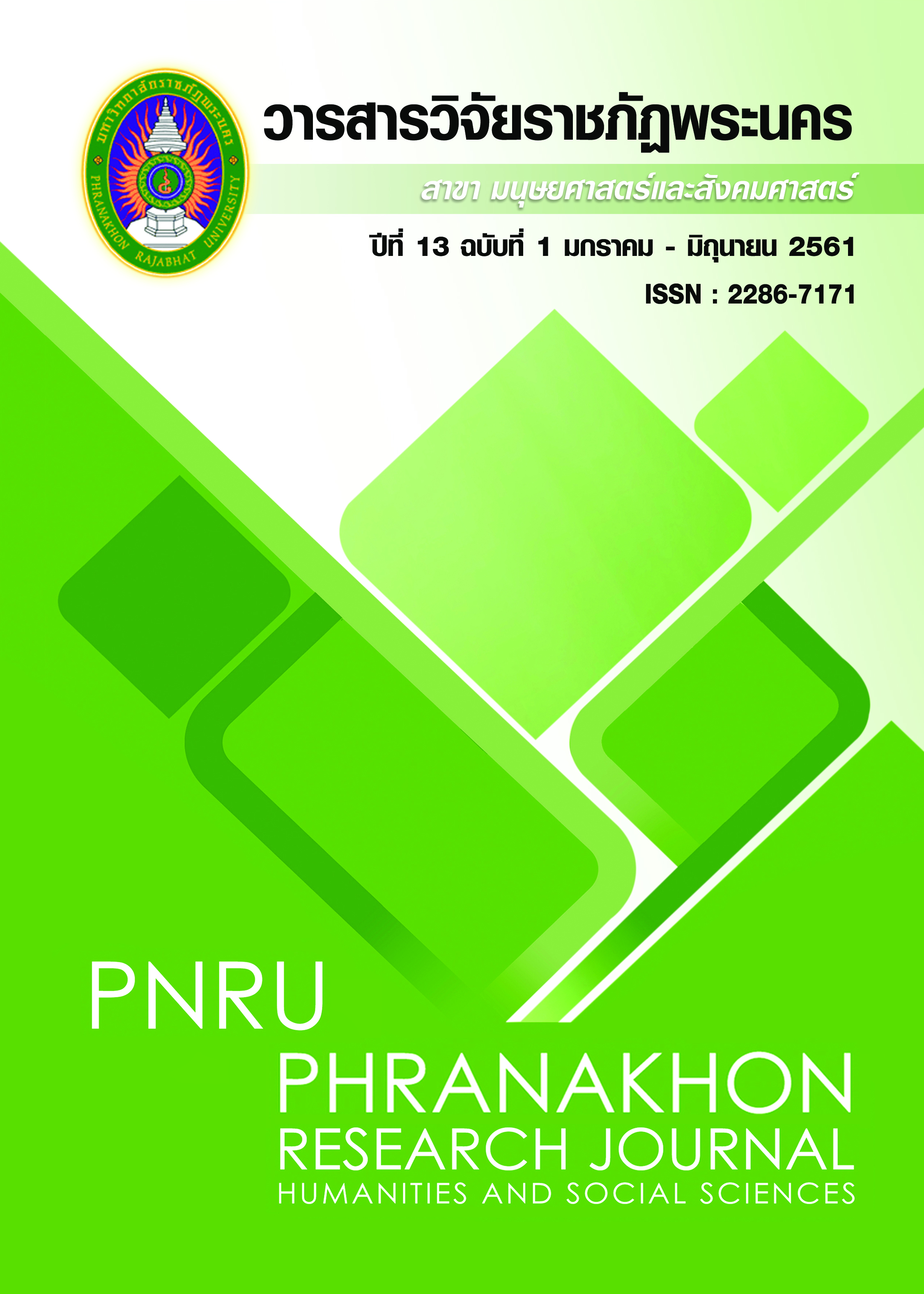อิทธิพลของคุณภาพสารสนเทศต่อการใช้งานระบบ ความพึงพอใจของผู้ใช้งาน และประโยชน์สุทธิของผู้ใช้งานระบบบริหารจัดการลานตู้ของท่าเรือกรุงเทพ
Main Article Content
Abstract
The purposes of this research were to study (1) the influence of the factors of information
quality, content, accuracy, format, completeness and timeliness on the use of the CTMS
(Container Terminal Management System), (2) the influence of factors on user satisfaction, i nformation quality, and the use of the CTMS, and (3) the influence of factors on user net benefits, use, and user satisfaction of CTMS. The research instrument was a questionnaire which collected from 148 users at Bangkok Deep Water Seaport and analyzed using techniques of descriptive statistics, frequency distribution, percentage, mean, standard deviation and path analysis. The results found that information quality in the dimensions of format had a positive and direct influence on system usage, information quality in the dimensions of completeness had a positive and direct influence on system usage, information quality in the dimensions of timeliness had a positive and direct influence on system usage, information quality in the dimensions of content
had a positive and direct influence on user satisfaction, information quality in the dimensions of accuracy had a positive and direct influence on user satisfaction, information quality in the dimensions of completeness had a positive and direct influence on user satisfaction, information quality in the dimensions of timeliness had a positive and direct influence on user satisfaction, information usage had a positive and direct influence on user satisfaction, system usage had a positive and direct influence on net benefit; and user satisfaction had a positive and direct influence on user net benefit.
Article Details
Each publish articles were copyright by Phranakorn Rajabhat University
Any contents which appeared in each articles in the journal were authors personal opinion. It did not relate to Phranakorn Rajabhat University and other instructors in the university. Each authors would take responsibility on their articles. If there are any mistake, the authors will take responsibility themselves
References
Sciences and Humanities. 9 (1), 33-50.
Bailey, J. E., & Pearson, S. W. (1983). Development of a tool for measuring and analyzing
computer user satisfaction. Management Science. 29(5), 530-545.
Chen, H., & Qi, Y. (2016). The evaluation of customer satisfaction with the thirdparty logistics service quality for online shopping. Advances in Economics and Business. 4(5), 201-207.
Chiarini, A., & Douglas, A. (2015). The impact of logistics solutions on customer satisfaction: an exploratory qualitative study of manufacturing companies. Sinergie Italian Journal of Management.
33(97), 255-270.
Choy, K. L., Gunasekaran, A., Lam, H. Y., Chow, K. H., Tsim, Y. C., Ng, T. W., & et al. (2014). Impact of information technology on the performance of logistics industry: the case of Hong
Kong and Pearl Delta region. Journal of the operational research society. 65(6), 904-916.
DeLone, W. H., & McLean, E. R. (1992). Infor-mation systems success: the quest for the dependent variable. Information systems research. 3(1), 60-95.
DeLone, W. H., & McLean, E. R. (2003). The DeLone and McLean model of information systems success: a ten year update. Journal of management Information System. 19(4), 9-30.
Doll, W. J., & Torkzadeh, G. (1988). The measurement of end-user computing satisfaction. MIS Quarterly. 12(2), 259-273.
Dooley, P. (2015). An empirical development of critical value factors for fystem quality and information quality in business intelligence system implementations. Ph.D. Thesis, Nova
Southeastern University, USA.
Field, A. (2005). Discovering statistics using SPSS. 2nd Edition. CA: Sage.
Floropoulos, J., Spathis, C., Halvatzis, D., & Tsipouridou, M. (2010). Measuring the success of the Greek taxation information system. International Journal of Information Management. 30, 47-56.
Golob, T. F. (2003). Review structural equation modeling for travel behavior research. Transportation Research. 37, 1-25.
Hair, J. F., Jr., Black, W. C., Babin, B. J., Anderson, R. E., & Tatham, R. L. (2010). Multivariate data analysis. 7th Edition. NJ: Pearson-Prentice Hall.
Harris. I., Wang, Y., & Wang, H. (2015). ICT in multimodal transport and technological trends: Unleashing potential for the future. International Jouranl of Production Economics. 159, 88-103.
Henesey, L. (2006). Multi-agent container terminal management. Ph.D. Thesis, Karlshamn Blekinge Institute of Technology, Sweden.
Kim, A. J., & Johnson, K. K. (2016). Power of consumers using social media : Examining the influences of brand-related user-generated content on Facebook. Computers in Human Behavior. 58, 98-108.
Li, Y., Zobel, C. W., & Russell, R. S. (2017). Value of supply disruption information and information accuracy. Journal of Purchasing and Supply Management. 23(3), 191-201.
Petter, S., DeLone, W. H., & McLean, E. R. (2008). Measuring information systems success : models, dimensions, measures, and interrelationships. European Journal of Information Systems. 17(3), 236-263.
Petter, S., & McLean, E. R. (2009). A meta-analytic assessment of the DeLone and McLean IS success model: an examination of IS success at the individual level. Information & Management. 46(3), 159-166.
Politis, Y., Giovanis, A., & Binioris, S. (2014). Logistics service quality and its effects on customer satisfaction in the manufacturing companies’ supply chains : empirical evidence from Greece. Journal of Modelling in Management. 9(2), 215-237.
Port Authority of Thailand. (2011). History. Retrieved January 11, 2018, from https://www.port.co.th/sitenew/ topic1_know01.php. (In Thai)
Stank, T. P & Pellathy, D. A. (2017). New frontiers in logistics research : theorizing at the middle range. Journal of Business Logistics. 38(1), 6-17.
Tseng, S. M. (2017). How information quality leads to operational capabilities and corporate performance. International Journal of Innovative Science, engineering and Technology. 4, 26-34.
Tseng, P. H., & Liao, C. H. (2015). Supply chain integration, information technology, market orientation and firm performance in container shipping firms. The International Journal of
Logistics Management. 26(1), 82-106.
Yang, Y.-Cl, & Chen, S.-l. (2016). Determinants of global lonistics hub ports : comparison of the port development policies of Taiwan, Korea, and Japan. Transport Policy. 45, 179-189.
Yeo, G. T., Thai, V. V., & Roh, S. Y. (2015). An analysis of port service quality and customer satisfaction: the case of Korean container ports. The Asian Journal of Shipping and Logistics.
31(4), 437-447.
Yu, K., Cadeaux, J., & Song, H. (2017). Flexibility and quality in logistics and relationships. Industrial Marketing Management. 62, 211-225.


